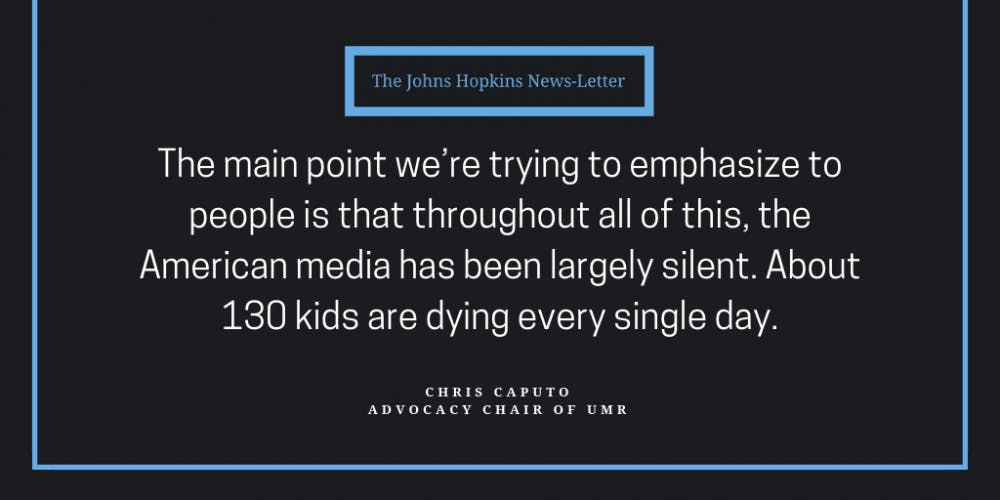The Hopkins United Muslim Relief (UMR) hosted Youth for Youth | Yemen on Tuesday and Wednesday as a means to increase campus awareness of Yemen’s civil war. UMR is an organization dedicated to spreading awareness of ongoing global humanitarian crisis and works to provide aid to affected areas. This event focused on the impact that the war has on children in Yemen.
The United Nations (UN) declared that the current war is the worst ongoing humanitarian crisis of 2018, with more than 22 million people in need of some form of humanitarian aid. According to Advocacy Chair Chris Caputo, UMR aims to increase student advocacy and education to mobilize students working to better international aid.
“Our goal today was to spread awareness throughout the study about what’s going on in Yemen right now — most people don’t have a clue what’s going on, even though there’s a massive humanitarian crisis,” he said. “The main point we’re trying to emphasize to people is that throughout all of this, the American media has been largely silent. About 130 kids are dying every single day.”
For years, Houthi rebels and the Yemeni government have clashed, leading to a high death toll throughout the country.
In September, the UN Human Rights Council released a report on its four-year investigation into the war, stating that individuals in Yemen’s officially-recognized government, Saudi Arabia and the United Arab Emirates (UAE) are implicated in possible war crimes. Similarly, Houthi forces have shelled civilians, imprisoned dissidents and recruited child soldiers.
According to the UN Children’s Agency, over 5,000 children have been killed or injured as a result of this war, and over 400,000 are malnourished.
Anishta Khan, co-president of UMR, believes that the University has the potential to make a difference in the ongoing crisis because Hopkins, alongside other universities, has the resources to provide help to Yemen’s population.
“The U.S. is complicit in the war. I think an American university like ours particularly needs to be in this conversation,” she said. “We already know that Hopkins is an apolitical campus, so there wasn’t much dialogue about the U.S. involvement in the war, but I think that’s important to bring to light.”
Khan added that by informing students about the war in Yemen, she hopes that the University will further provide help to those in need in regard to food security, helping displaced refugees and involvement of the Hopkins Humanitarian Center for Health.
“It’s important to mobilize the campus in some ways that are not just theoretical or academic and to understand that we are affecting the lives of real people thousands of miles away,” she said. “Because of the nature of urgency of the conflict, we thought it was part of our mission to advocate for the Yemeni people.”
Though the U.S. does not directly fund an Arab coalition, which works to defeat the Houthi rebels, it sends billions of dollars worth of weapons. The amount and value of the weapons sent is far more than the humanitarian aid the U.S. sends.
Sophomore Ben Schneider criticized the involvement of the U.S. in the war, in turn criticizing the close ties between the University and the Department of Defense (DOD).
“Hopkins funnels engineering students into the Department of Defense,” he said. “Hopkins gets the most funding of any university from the DOD.”
Because both Houthi forces and the coalition have targeted humanitarian groups, the International Committee of the Red Cross withdrew all but 450 of its personnel this past June. According to the UN, 6,660 civilians have been killed and 10,563 injured and thousands more have died from preventable causes.
Khan said that because of the lack of accessible aid, one focus of UMR is raising money to provide resources to those in Yemen.
“This semester, we want to make a fundraiser — both online and a physical fundraiser on campus — to fund Yemeni youth. The children of Yemen are being deprived of necessities like food, water and education because of the war,” she said.
Sophomore Laura Kaye attended the event on Tuesday. She said that by focusing on Yemini youth, the UMR was able to efficiently stress the importance of student involvement.
“As young people, we can sympathize with the experience of other young people and it’s really important for us to take responsibilities for the U.S. actions in Yemen,” she said. “Even though it might seem like a really far away place, it’s something we can relate to and should relate to as U.S. citizens or students at a U.S. institution.”





